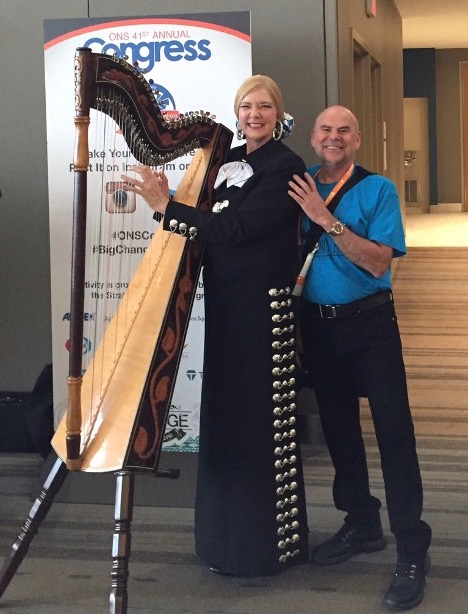Given their work and involvement in an individual’s cancer journey, oncology nurses can help motivate and influence patients. Sometimes this motivation leads to particularly special circumstances. Whether you consider it a moment of luck or a chance of fate, everything can fall into place. That was the case for ONS member Robert Zamora, RN, OCN®, a retired oncology and stem cell transplant nurse living in San Antonio, TX, when Linda Hart-Garrahan was put under his care in fall 2015.
Zamora and Hart-Garrahan met when Hart-Garrahan, who was diagnosed with lymphoma in 2012, spent time in the hospital for a stem cell transplant in October 2015. When Zamora first introduced himself as her nurse, he couldn’t help but notice how Hart-Garrahan had quite the conversation piece in her hospital room: a harp.
As a dedicated musician, Hart-Garrahan never went too long without playing, so prior to being admitted, she had asked her oncologist and the institution if she could bring the harp to the hospital. To her surprise, they agreed and allowed her to practice her music in her room. The healthcare providers were very respectful of the instrument, too.
“That is the power of listening to the patient,” she praised. “They just knew that this patient needed this to get through the process. It was so crazy, but because the harp was in my room, it was like an automatic topic of discussion. It kind of broke down the barrier of just being a sterile room.”
You can probably imagine the sight—a giant, angelic harp sitting in an already cramped hospital room. It caught the attention of many, including Zamora. He inquired about it, and that’s when he learned Hart-Garrahan played in a mariachi band.
In a twist of fate, Zamora happened to be in the market for a mariachi band. As a San Antonio ONS Chapter current board member and past president, he had been tasked with finding a local mariachi band to play at the opening of the 2016 ONS Congress®, which was held in San Antonio, TX.
“I went to different restaurants and such looking for a band, but then I saw she [Hart-Garrahan] had a harp in her room,” he explained. “So, I asked, ‘Do you play the harp?’ And she said she did, and that she played in a mariachi group, which was unique. So, we talked and she shared tapes of her music.”
Zamora said that her band sounded great, and he invited them to play at the 2016 ONS Congress. “Although she was at her lowest before recovering, as patients are following a transplant, I told her that her group was going to play at Congress and that by May, she was going to be fine.”
Hart-Garrahan said she had her doubts. After her cancer treatment, she said she was really at her worst, both physically and mentally, and she was hesitant about even just having the strength and ability to play her harp.
“He promised me I would play, and I said, ‘Robert, there’s no way. I can’t play the harp. I can’t hold it. I can barely go to the bathroom and back. This isn’t going to happen,’” Hart-Garrahan said. “I couldn’t understand at that moment how, with the right care, advice, and team, you can recover. It’s not quick, but can you recover.”
Zamora believed in her. With her the harp and her music as her motivation and the support of a great healthcare team, Hart-Garrahan felt empowered to invest the time and her resilience in her recovery. She credited her strength to the oncology nurses, including Zamora, who supported and encouraged her throughout her hospital stay.
“Zamora never asked how I was doing because that would allow me to go negative, and I think he knew that,” she said. “There wasn’t any time to be ‘poor, pitiful me’ around him because he’s so upbeat and very compassionate. He and all the nurses gave one hundred and fifty percent.”
In spring 2016, Zamora’s predictions came true. Among the mariachi band welcoming oncology nurses around the world to ONS Congress was Hart-Garrahan and her harp. It was her first time back playing with the band, and the significance was not missed.

“She recovered, and then she played. And she loved it,” Zamora said. “While she was there, she was telling people that we were her angels and all that. She was very appreciative.”
Six years later, Hart-Garrahan still praises the nurses, especially Zamora, who helped her find her music again. Zamora told her to not let her cancer diagnosis define her, and Hart-Garrahan took that to heart. “Who got me through it were the nurses, the oncology nurses, and I would’ve never been able to do this without their advice, help, and motivation,” she said.
In retirement, Zamora said that he reflects on his career and former patients, including Hart-Garrahan, with such positivity. He said that nursing was his calling in life and fondly remembers interacting with patients and teaching them about their cancer journey. “It was a calling,” he said. “I never thought I would be a nurse. Nursing has to be a calling.”






